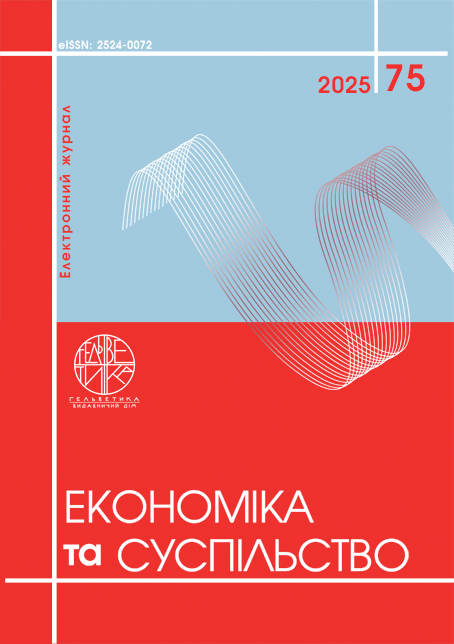ІНТЕГРАЦІЯ ПОДАТКОВОЇ БЕЗПЕКИ В СИСТЕМУ ЕКОНОМІЧНОЇ БЕЗПЕКИ УКРАЇНИ: ІНСТИТУЦІЙНО-ПРАВОВИЙ ВИМІР
Анотація
У статті здійснено теоретико-методологічне узагальнення підходів до трактування сутності податкової безпеки в контексті її інституціоналізації як складової економічної безпеки держави. Доведено, що податкова безпека є не лише функціональним елементом податкової політики, а й компонентом системи економічної безпеки, що потребує нормативної визначеності. Виявлено суперечності правового регулювання, які обумовлюють управлінську фрагментарність. Обґрунтовано необхідність її формалізації через законодавче визначення, розроблення концепції, методик оцінювання та механізмів міжвідомчої взаємодії в межах державної економічної стратегії. Підкреслено важливість інтеграції податкової безпеки у процес стратегічного планування економічної безпеки, що передбачає створення єдиного правового поля, запровадження ризикоорієнтованих підходів та забезпечення належної інституційної координації.
Посилання
Крамаренко К. М., Сахно І. В. Податкова безпека в управлінні фінансовою безпекою держави. Ефективна економіка. 2020. № 4. URL: http://www.economy.nayka.com.ua/?op=1&z=7763 DOI: https://doi.org/10.32702/2307-2105-2020.4.52
Малий В. М. Щодо визначення поняття податкової безпеки / В. М. Малий. Форум права. 2015. № 5. С. 130–135. URL: http://nbuv.gov.ua/UJRN/FP_index.htm_2015_5_24
Пархоменко-Куцевіл О. Концептуальні засади формування податкової безпеки в системі національної безпеки України. Наукові перспективи (Naukovì perspektivi). 2021. № 10 (16). DOI: https://doi.org/10.52058/2708-7530-2021-10(16)-162-170
Іванишина О. С., Прокопенко І. А., Панура Ю. В. Удосконалення податкової системи як фактор підвищення фінансової безпеки держави. Ефективна економіка. 2021. № 4. – URL: http://www.economy.nayka.com.ua/?op=1&z=8775 DOI: https://doi.org/10.32702/2307-2105-2021.4.75
Bashynskiy I. A. Tax culture of the population in Ukraine: recommendations for improvement. Science and Education a New Dimension. 2019. Vol. VII(213), no. 35. P. 7–10. DOI: https://doi.org/10.31174/send-hs2019-213vii35-01
Прокопенко І. А. Податкова культура та її вплив на підвищення рівня податкових надходжень. Міжнародний науковий журнал "Інтернаука". Серія: "Економічні науки". 2023. №4. DOI: https://doi.org/10.25313/2520-2294-2023-4-8820
Буканов Г., Кузьменко О., Волохов О. Вплив змін у податковому законодавстві на економічну стабільність україни. Social Development: Economic and Legal Issues. 2025. № 5. URL: https://doi.org/10.70651/3083-6018/2025.5.09
Ватульов А. В. Податкова політика в умовах соціально-економічних перетворень. Інвестиції: практика та досвід. 2025. № 5. С. 82–88. DOI: https://doi.org/10.32702/2306-6814.2025.5.82
Методичні рекомендації щодо розрахунку рівня економічної безпеки України: наказ Міністерства економічного розвитку і торгівлі України від 29.10.2013 № 1277. URL: https://zakon.rada.gov.ua/rada/show/v1277731-13#Text
Таращенко В.А. Податкова безпека як складова економічної безпеки України. Український економічний часопис. 2024. № 6. С. 153–157. DOI: https://doi.org/10.32782/2786-8273/2024-6-25
Скорик М., Главацька Д. Податковий контроль в умовах воєнного стану в Україні: правові обмеження та економічні виклики. Цифрова економіка та економічна безпека. 2025. № 2 (17). С. 439-443. DOI: https://doi.org/10.32782/dees.17-71
Kramarenko K. M., Sakhno I. V. (2020) Podatkova bezpeka v upravlinni finansovoiu bezpekoiu derzhavy [Tax security in the management of the state's financial security]. Efektyvna ekonomika – Effective Economy, no. 4. Available at: http://www.economy.nayka.com.ua/?op=1&z=7763 DOI: https://doi.org/10.32702/2307-2105-2020.4.52
Malyi V. M. (2015) Shchodo vyznachennia poniattia podatkovoi bezpeky [On the definition of the concept of tax security]. Forum prava – Law Forum, no. 5, pp. 130–135. Available at: http://nbuv.gov.ua/UJRN/FP_index.htm_2015_5_24
Parkhomenko-Kutsevil O. (2021) Kontseptualni zasady formuvannia podatkovoi bezpeky v systemi natsionalnoi bezpeky Ukrainy [Conceptual foundations of tax security formation in the national security system of Ukraine]. Naukovì perspektivi – Scientific Perspectives, no. 10(16). DOI: https://doi.org/10.52058/2708-7530-2021-10(16)-162-170
Ivanyshyna O. S., Prokopenko I. A., Panura Y. V. (2021) Udoskonalennia podatkovoi systemy yak faktor pidvyshchennia finansovoi bezpeky derzhavy [Improving the tax system as a factor of increasing the state's financial security]. Efektyvna ekonomika – Effective Economy, no. 4. Available at: http://www.economy.nayka.com.ua/?op=1&z=8775 DOI: https://doi.org/10.32702/2307-2105-2021.4.75
Bashynskiy I. A. (2019) Tax culture of the population in Ukraine: recommendations for improvement. Science and Education a New Dimension. Humanities and Social Sciences, vol. 7(213), no. 35, pp. 7–10. DOI: https://doi.org/10.31174/send-hs2019-213vii35-01
Prokopenko I. A. (2023) Podatkova kultura ta yii vplyv na pidvyshchennia rivnia podatkovykh nadkhodzhen [Tax culture and its impact on increasing tax revenues]. Mizhnarodnyi naukovyi zhurnal "Internauka". Seriia: Ekonomichni nauky – International Scientific Journal "Internauka". Series: Economic Sciences, no. 4. DOI: https://doi.org/10.25313/2520-2294-2023-4-8820
Bukanov H., Kuzmenko O., Volokhov O. (2025) Vplyv zmin u podatkovomu zakonodavstvi na ekonomichnu stabilnist Ukrainy [Impact of tax law changes on Ukraine’s economic stability]. Social Development: Economic and Legal Issues, no. 5. DOI: https://doi.org/10.70651/3083-6018/2025.5.09
Vatulov A. V. (2025) Podatkova polityka v umovakh sotsialno-ekonomichnykh peretvoren [Tax policy under socio-economic transformations]. Investytsii: praktyka ta dosvid – Investments: Practice and Experience, no. 5, pp. 82–88. DOI: https://doi.org/10.32702/2306-6814.2025.5.82
Ministry of Economic Development and Trade of Ukraine (2013) Metodychni rekomendatsii shchodo rozrakhunku rivnia ekonomichnoi bezpeky Ukrainy [Methodological recommendations for calculating the level of economic security of Ukraine]. Available at: https://zakon.rada.gov.ua/rada/show/v1277731-13#Text
Tarashchenko V. A. (2024) Podatkova bezpeka yak skladova ekonomichnoi bezpeky Ukrainy [Tax security as a component of Ukraine's economic security]. Ukrainskyi ekonomichnyi chasopys – Ukrainian Economic Journal, no. 6, pp. 153–157. DOI: https://doi.org/10.32782/2786-8273/2024-6-25
Skoryk M., Hlаvatska D. (2025) Podatkovyi kontrol v umovakh voiennoho stanu v Ukraini: pravovi obmezhennia ta ekonomichni vyklyky [Tax control under martial law in Ukraine: legal limitations and economic challenges]. Tsyfrova ekonomika ta ekonomichna bezpeka – Digital Economy and Economic Security, no. 2(17), pp. 439–443. DOI: https://doi.org/10.32782/dees.17-71
Авторське право (c) 2025 Володимир Таращенко

Ця робота ліцензується відповідно до Creative Commons Attribution 4.0 International License.


